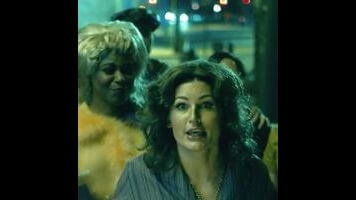In fact, the one story from the episode that features the most “traditional” bar fight scenario—though it doesn’t technically take place at a bar—avoids making its dueling men into swaggering heroes. At first, I was put off by Drunk History telling a story about Andrew Jackson that doesn’t center on his racist violence, worried he might come off as some sort of ruffian, a way he was often portrayed in the South when I was growing up. I was pleasantly surprised by the fact that, despite not touching on the many horrors he committed, this segment doesn’t romanticize Jackson. Kyle Kinane characterizes him and his pals as men who will leap at the chance to fight if they feel that their “honor”—a.k.a. their masculinity—has been threatened. He makes no pretense that duels are anything but stupid. The showdown is decidedly uncool. If Drunk History were trying to make it look badass, Jesse Benton would have somersaulted down the stairs in slow-motion. But here, he rolls down the stairs awkwardly in real-time, the bravado of the music perfectly contrasting his unstylish move. Kinane stresses just how terrible and unexciting of a fight this was, knocking these guys down a peg. There’s also something subtly subversive about casting Michael Cera, known for portraying timid, awkward, gentle boys, as Jackson.
The story about men squabbling over trivial bullshit gets wedged between two stories led by brave women with strong convictions, unafraid to back down as they fight for what they believe in. In the first, Amber Ruffin discusses Carrie Nation, the saloon smasher. Though Ruffin fundamentally disagrees with her practice of destroying alcohol (“But she be wrong though because this shit is delicious”), she nonetheless holds reverence for Nation’s tenacity. Vanessa Bayer gives a great performance as Nation that makes her feel like a real person instead of just some over-the-top caricature. The way she hesitantly starts smashing things and then gradually becomes more sure of herself is brilliant. As Ruffin explains, Nation was labeled by many as a crazy woman, but Drunk History makes it clear that she was a hero in her own right, even if the work she did goes against the show’s entire premise.
Last week, I joked that Drunk History should be taught in classrooms. This week, I’m quite serious when I say Crissle West’s retelling of the Stonewall riots should absolutely be taught in classrooms. At the very least, if there are any classrooms out there showing 2015’s Stonewall, their DVDs should immediately be replaced with clips of West drunkenly delivering truth bombs about what really went down on Christopher Street in 1969. Stonewall provides an egregiously white-washed retelling of what happened, seen through the eyes of its white, cis male protagonist. West makes sure trans women of color are at the forefront of her retelling, just as they were at the forefront of the movement. And Drunk History casts actual trans women for the reenactment, with the supremely underrated Alexandra Grey portraying Marsha P. Johnson and Transparent’s Trace Lysette portraying Sylvia Rivera. With those casting decisions alone, Drunk History schools the rest of Hollywood when it comes to telling trans stories.
West, who was one of last season’s best narrators, returns with another memorable, powerful retelling—accentuated by her very well placed profanities and her laugh, which Derek Waters correctly describes as the best laugh ever. She gets silly drunk, but she still conveys the seriousness of the riots and brings depth and emotional honesty to her characterization of Johnson. She educates at every turn and also touches on the aftermath of the riots, accomplishing far more in her less-than-10-minute segment than last year’s Stonewall movie does in its two hours.
Stray observations
- “Thank you for fucking letting me fucking vote, lady!”
- I was very worried when Ruffin and Waters went to actually smash glass bottles. It’s not nearly as easy as it looks! They’re lucky no one got cut! We can’t all be Carrie Nation!
- I choose to believe there is a subtle love story going on in the Carrie Nation reenactments:
- “She smashed that shit against the window and said I GOT MY CIVIL RIGHTS!”
- “I told myself I was not gonna get drunk this time.”
- Lysette’s jumpsuit is so great. I would also like to take this moment to say that Trace Lysette is the best part of the most recent season of Transparent.
- West’s drunken monologue about how Black people should be on U.S. currency (and Sacagawea “needs to get off the goddamn coin and onto some paper money) is especially apt given that Andrew Jackson has been featured on the 20-dollar bill for far too goddamn long. That’s changing, finally.


 Keep scrolling for more great stories from A.V. Club.
Keep scrolling for more great stories from A.V. Club.